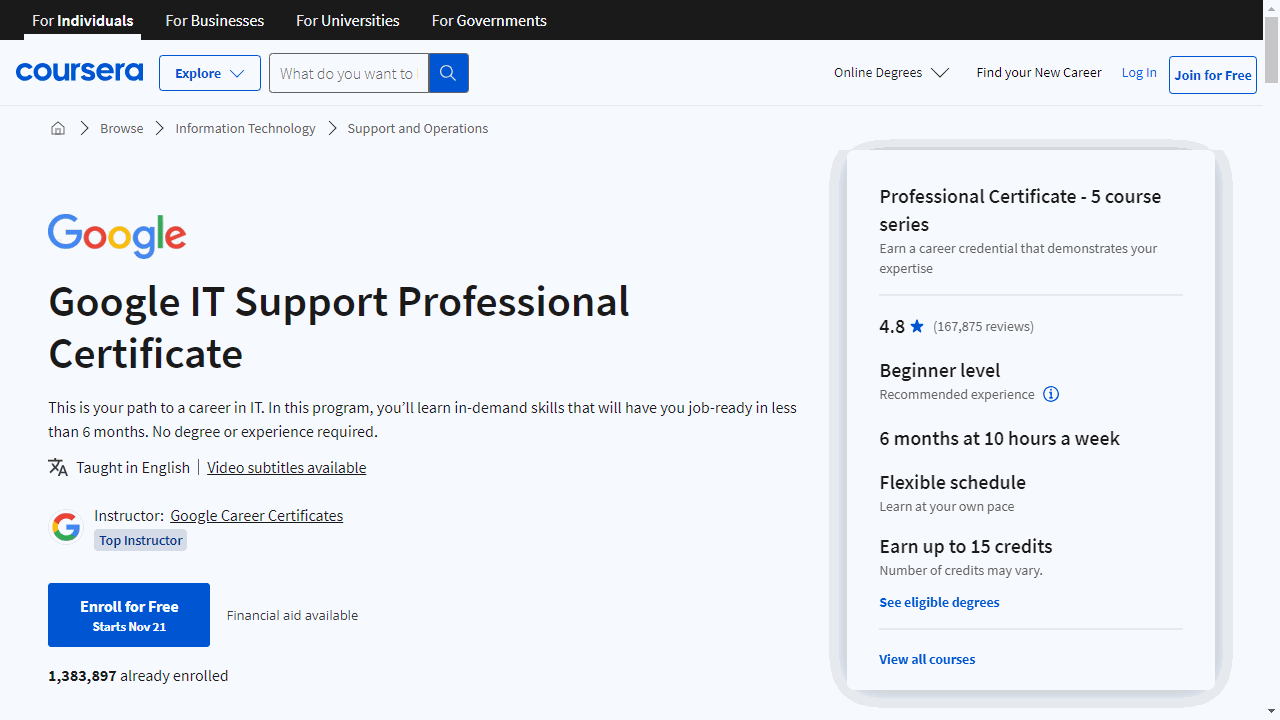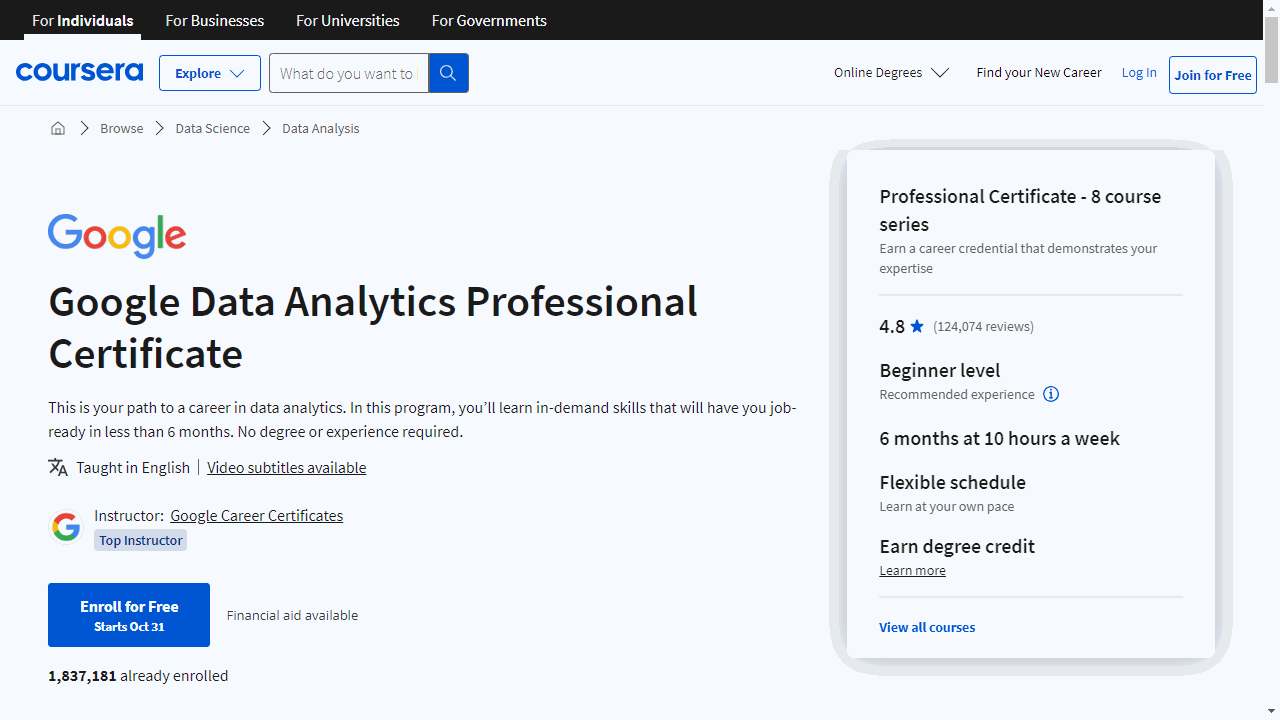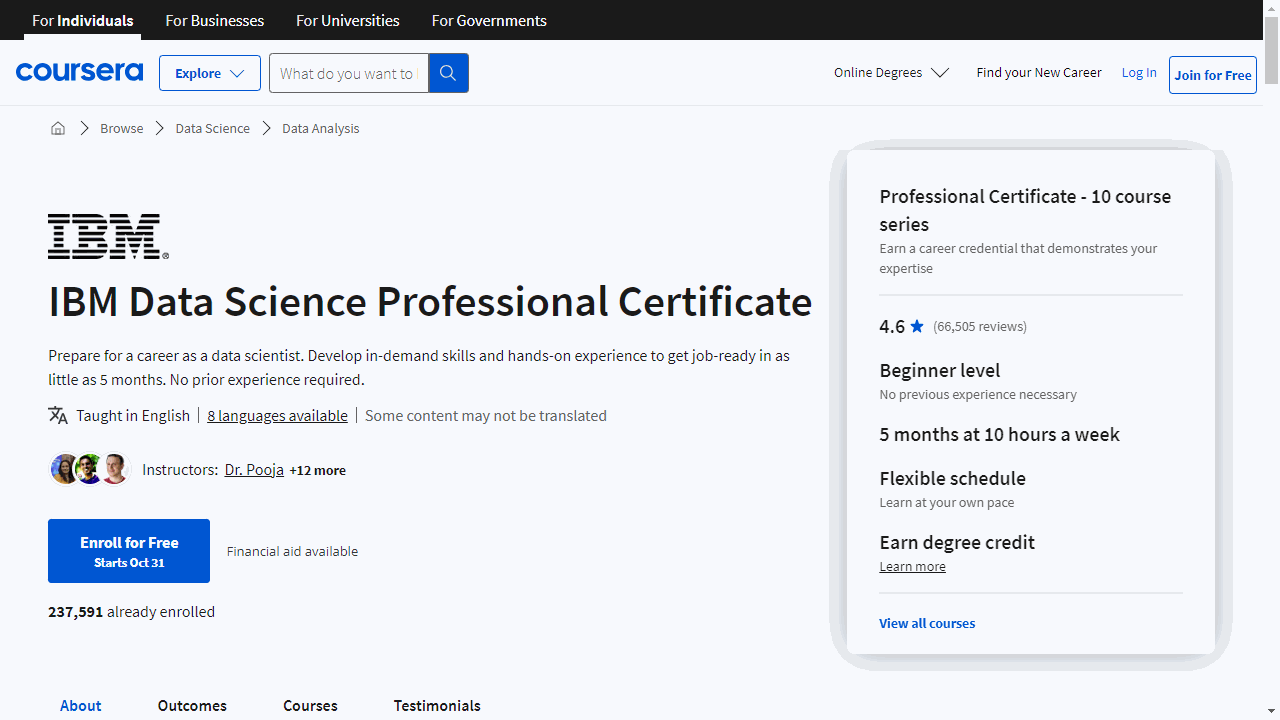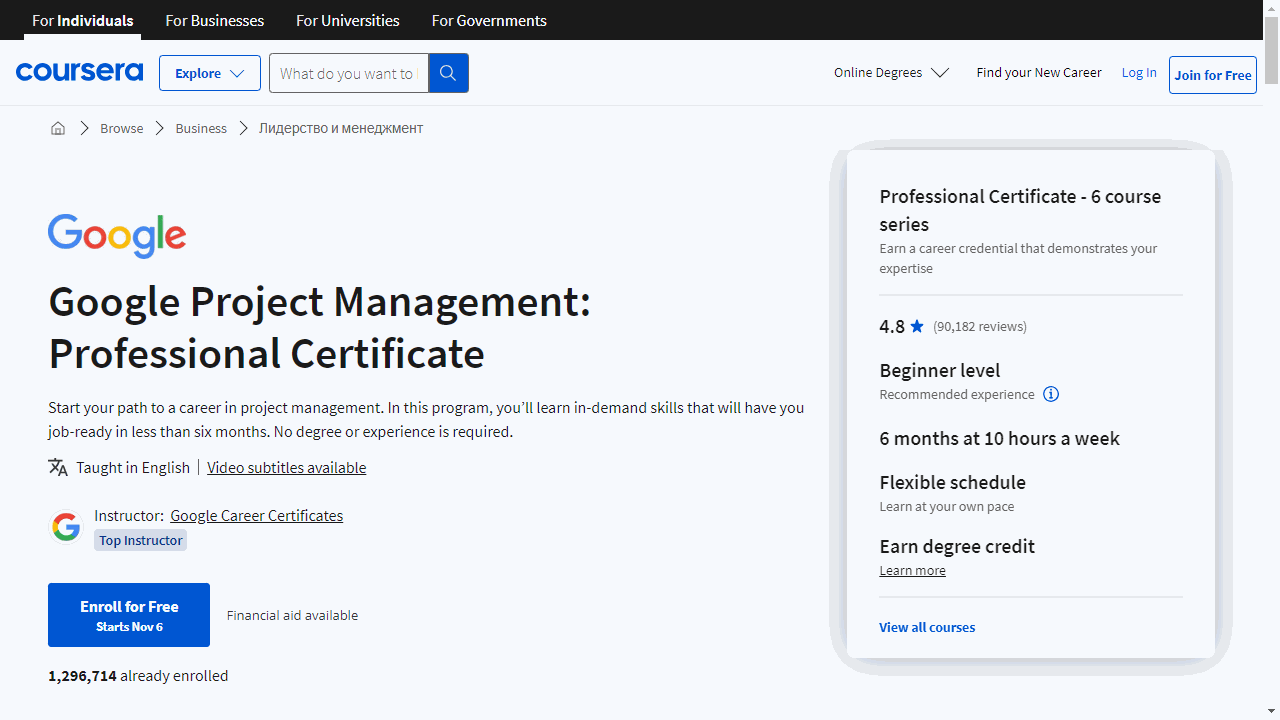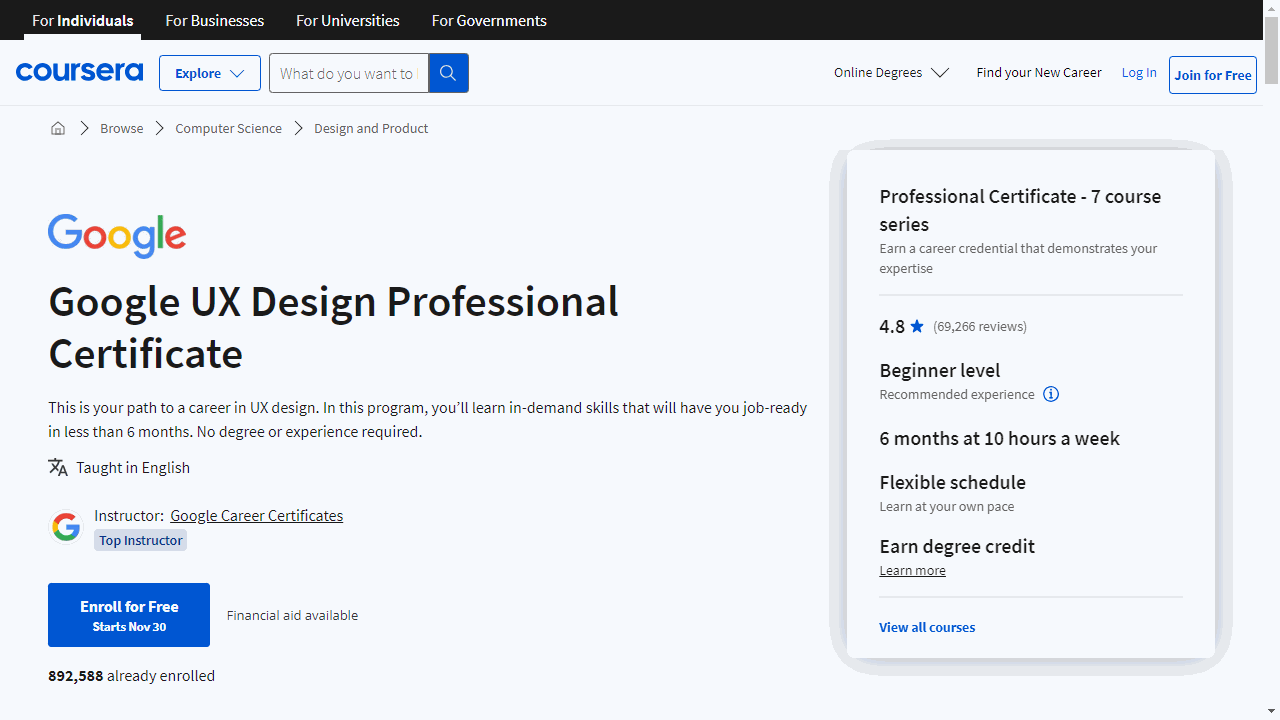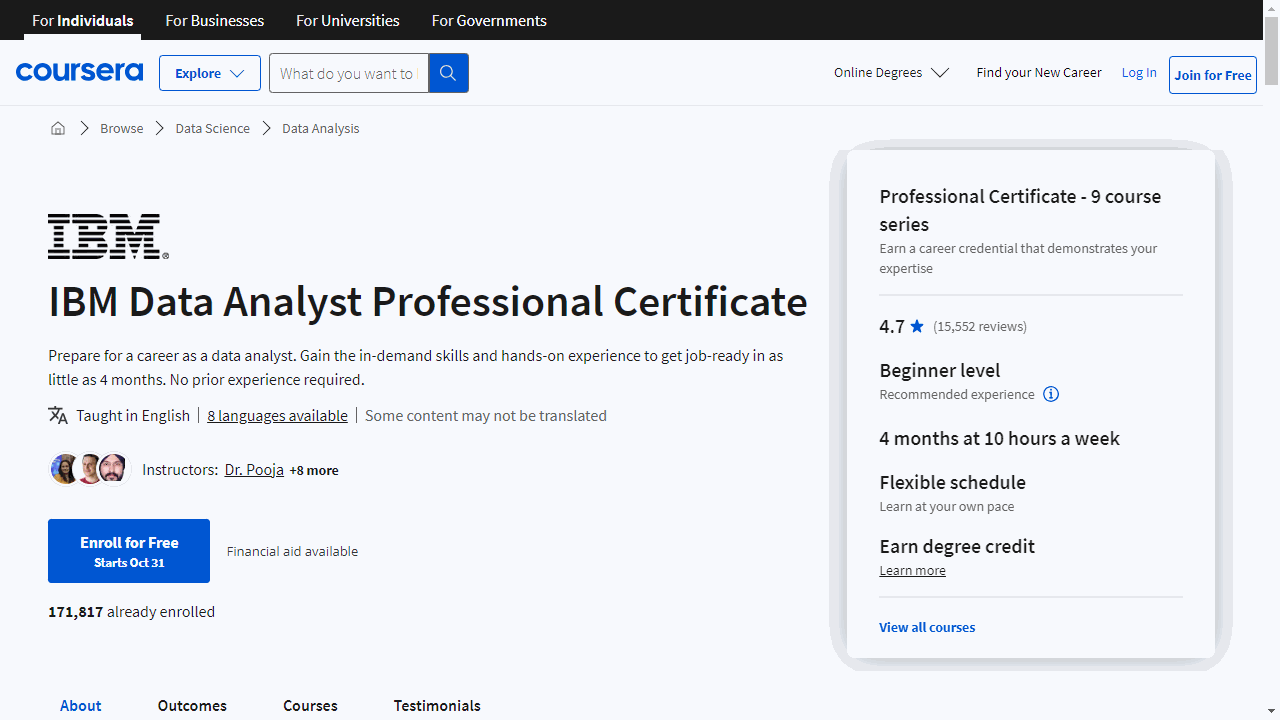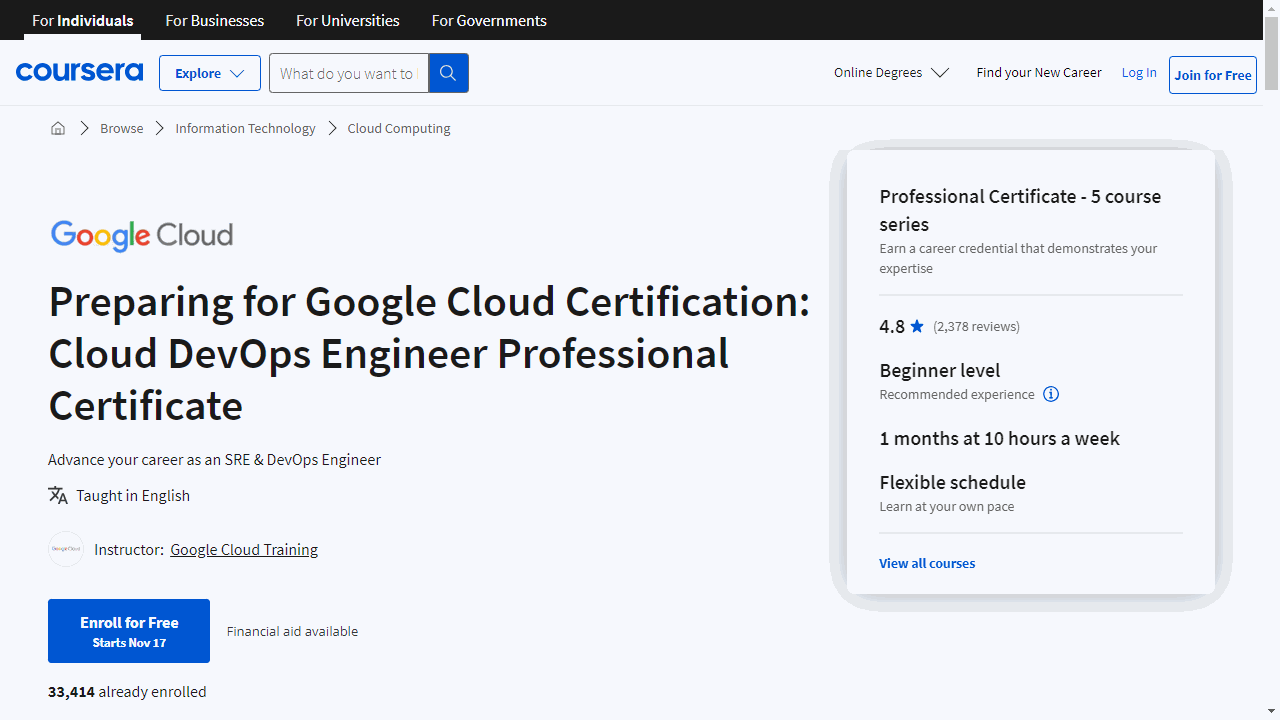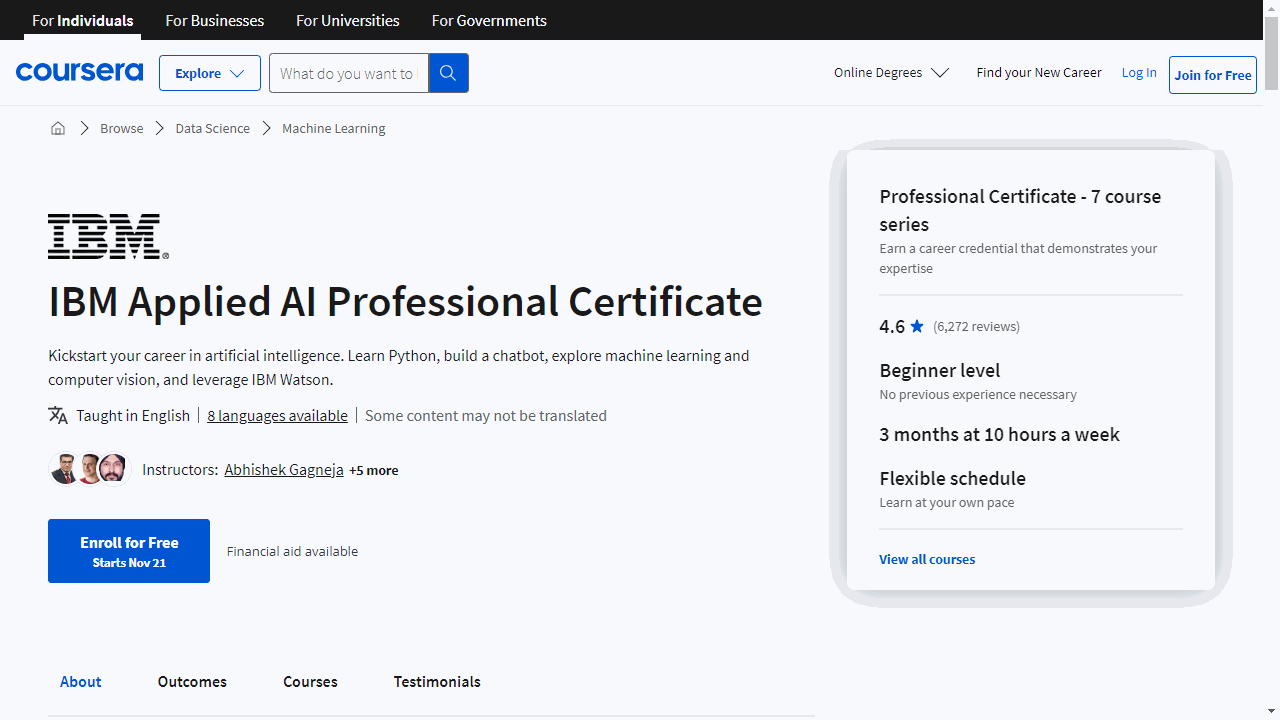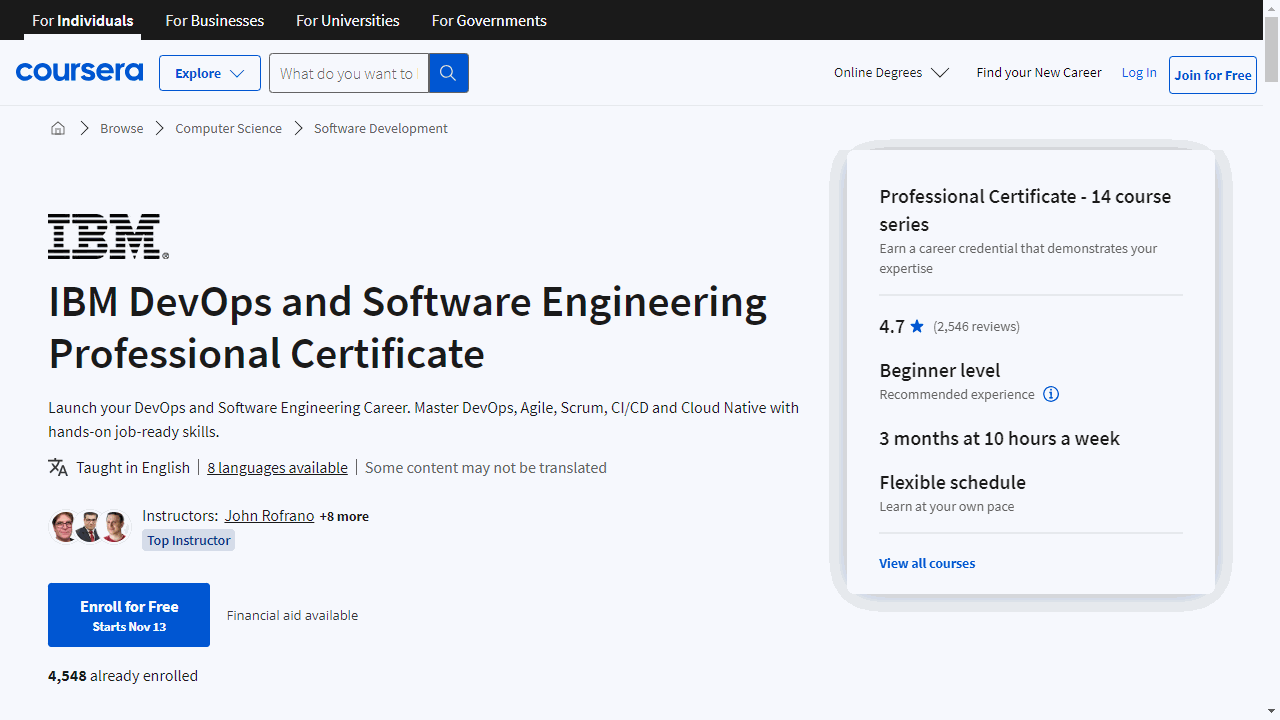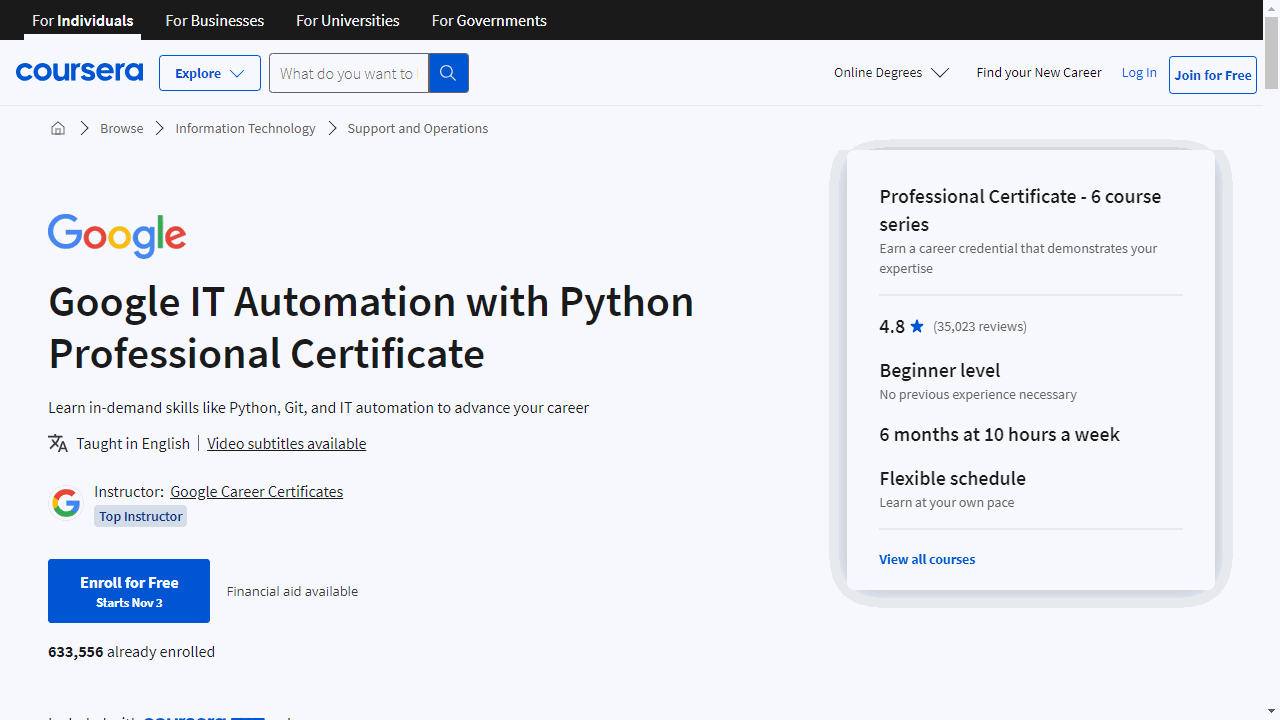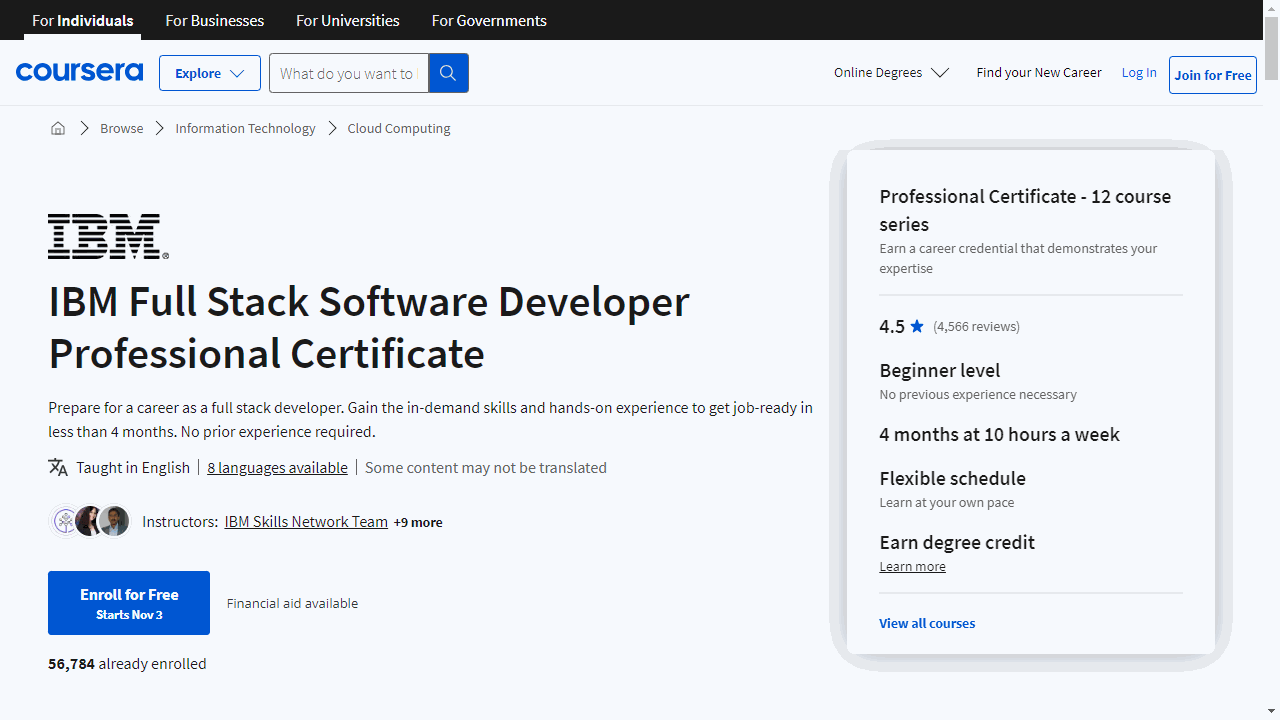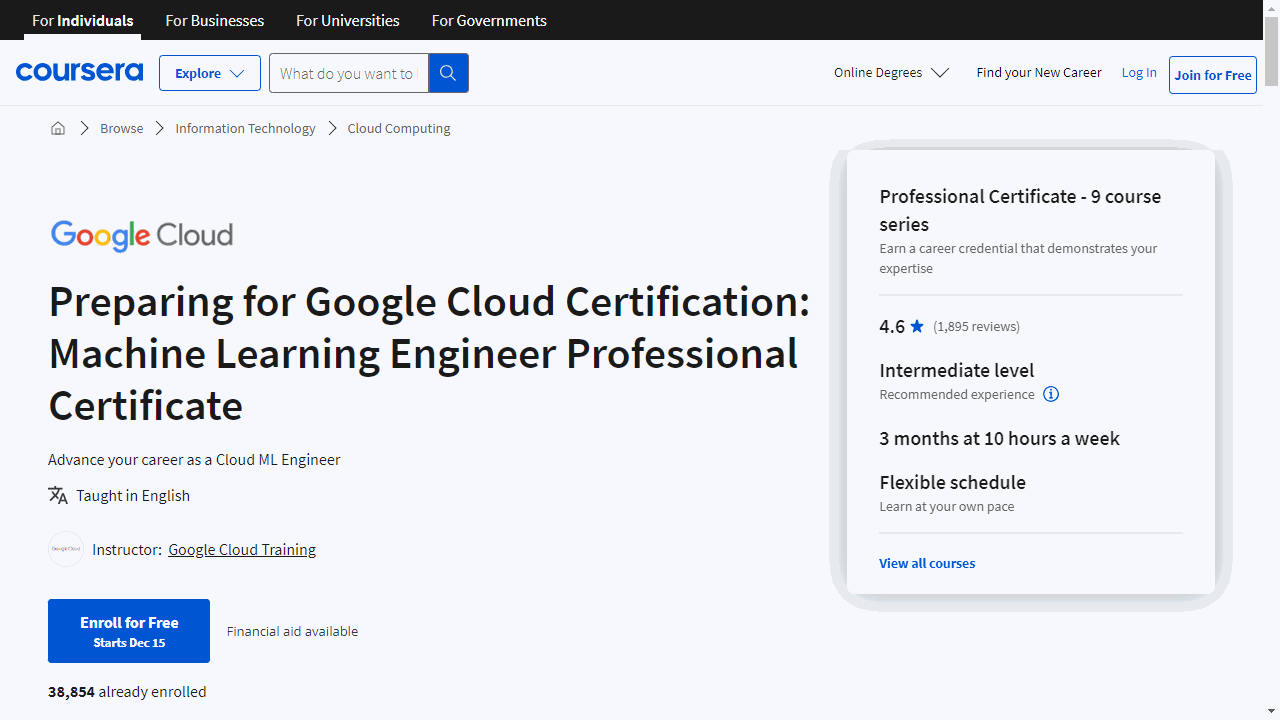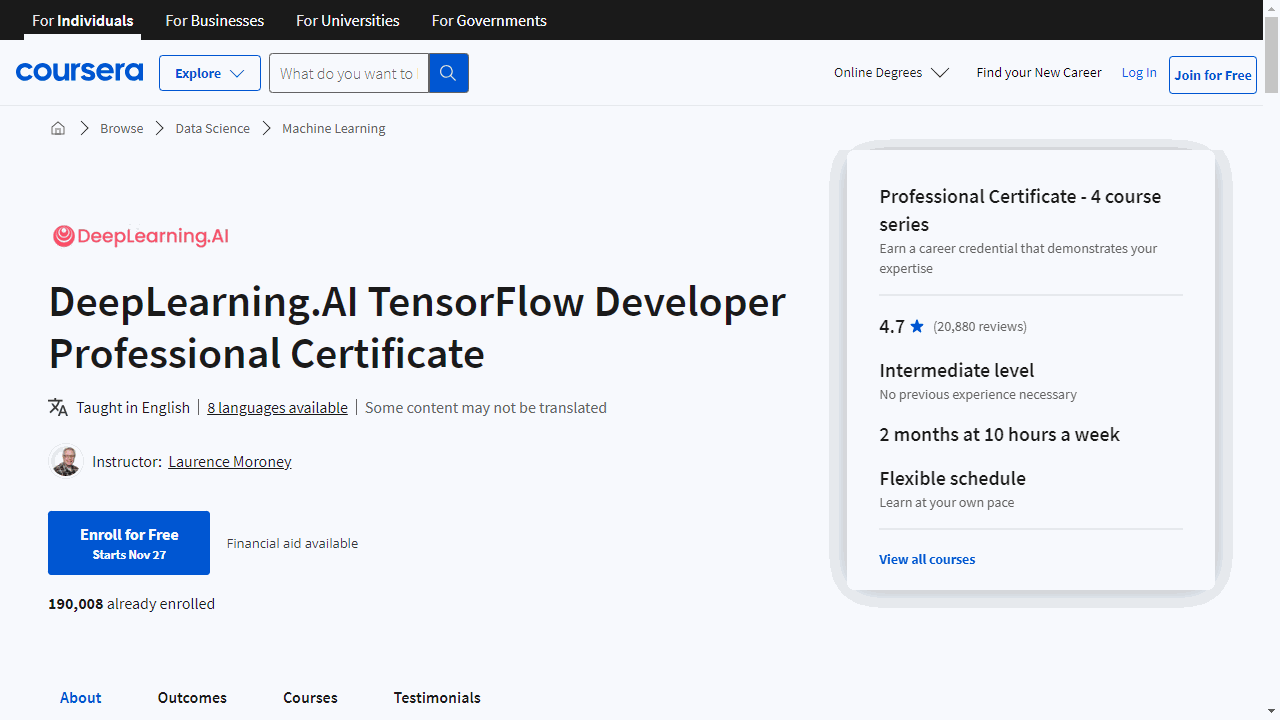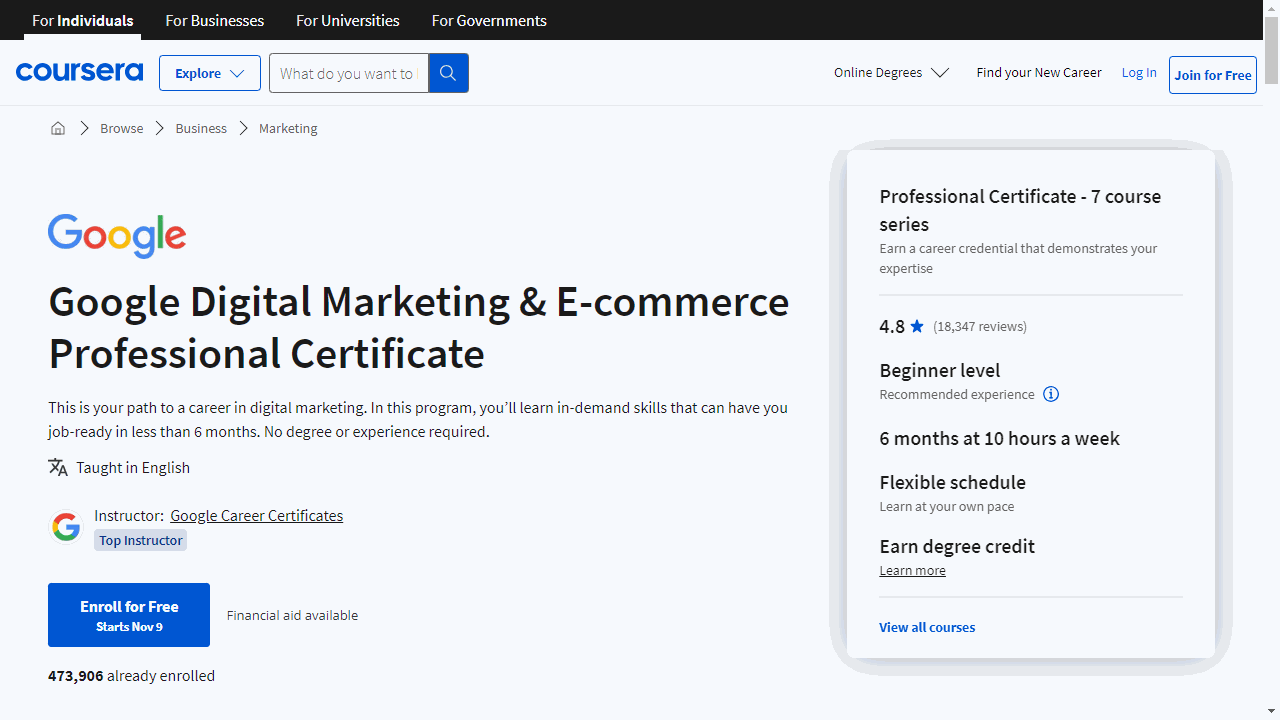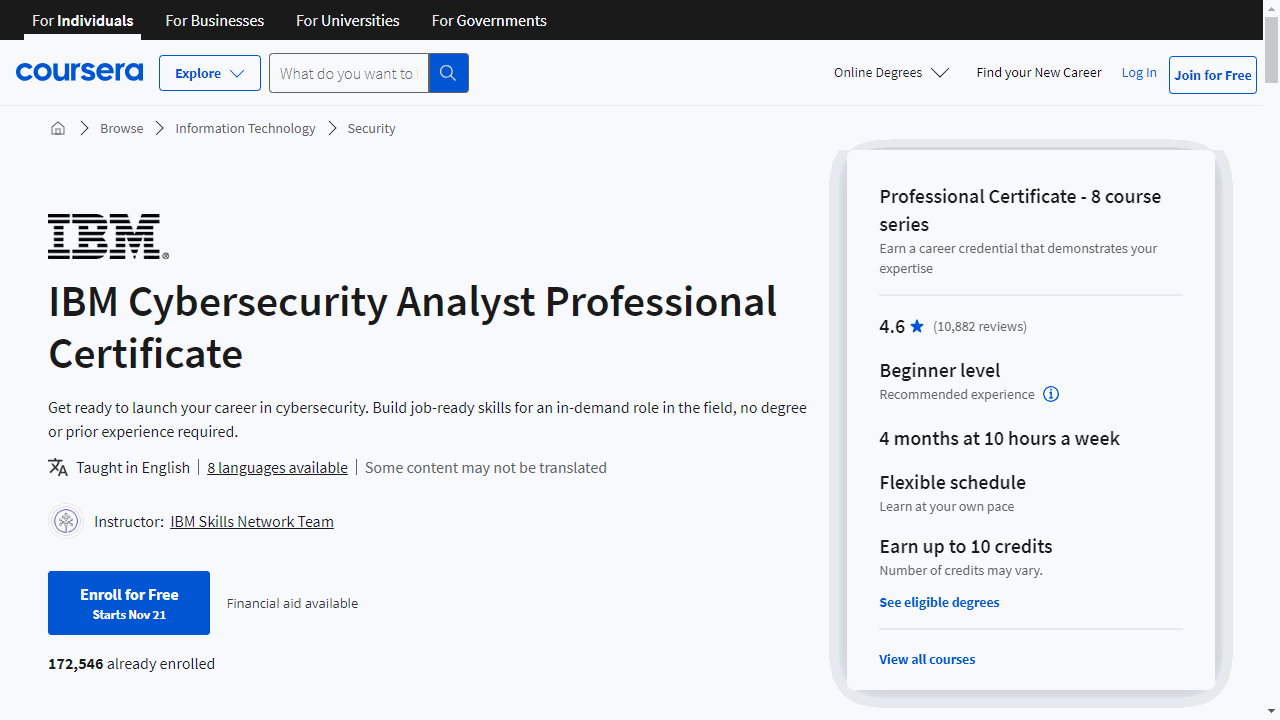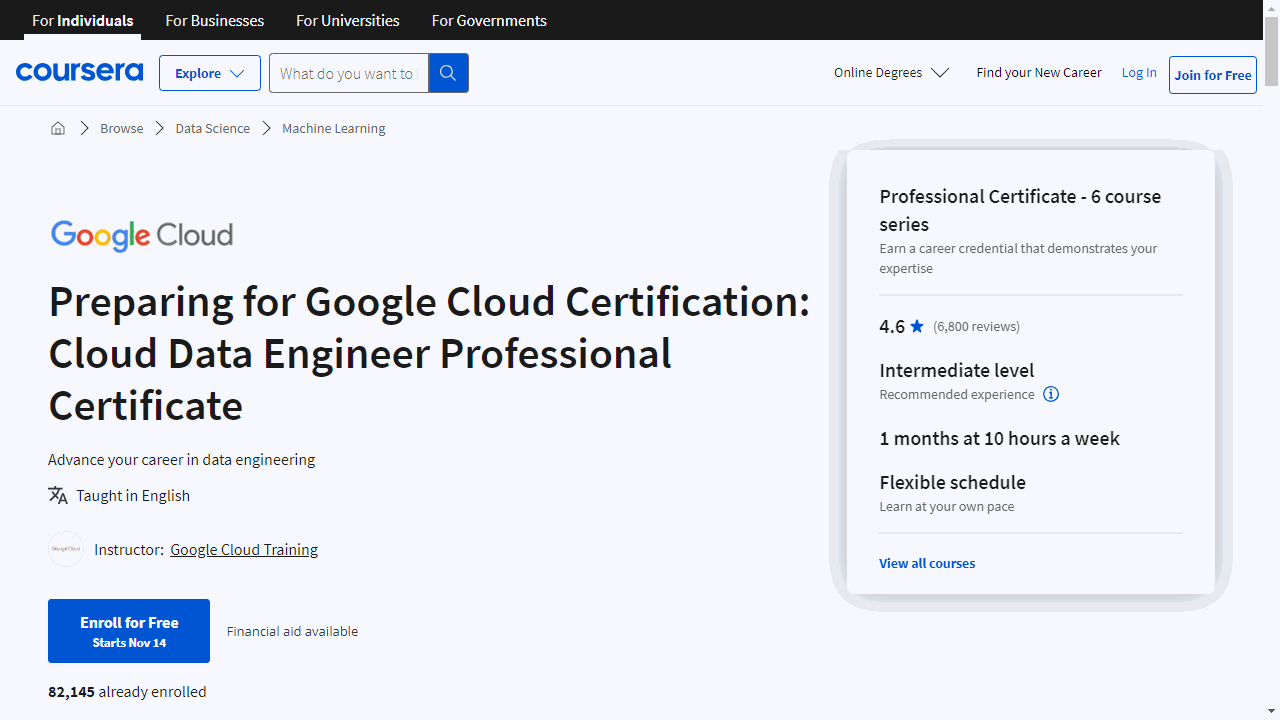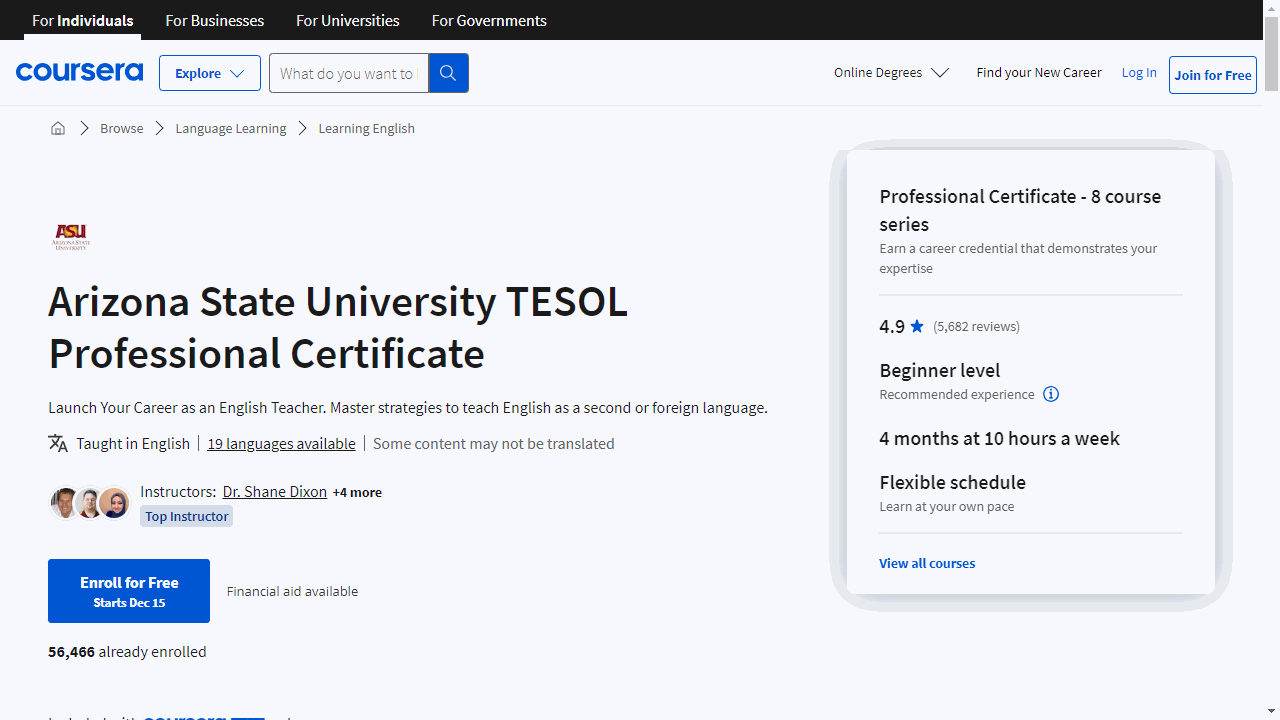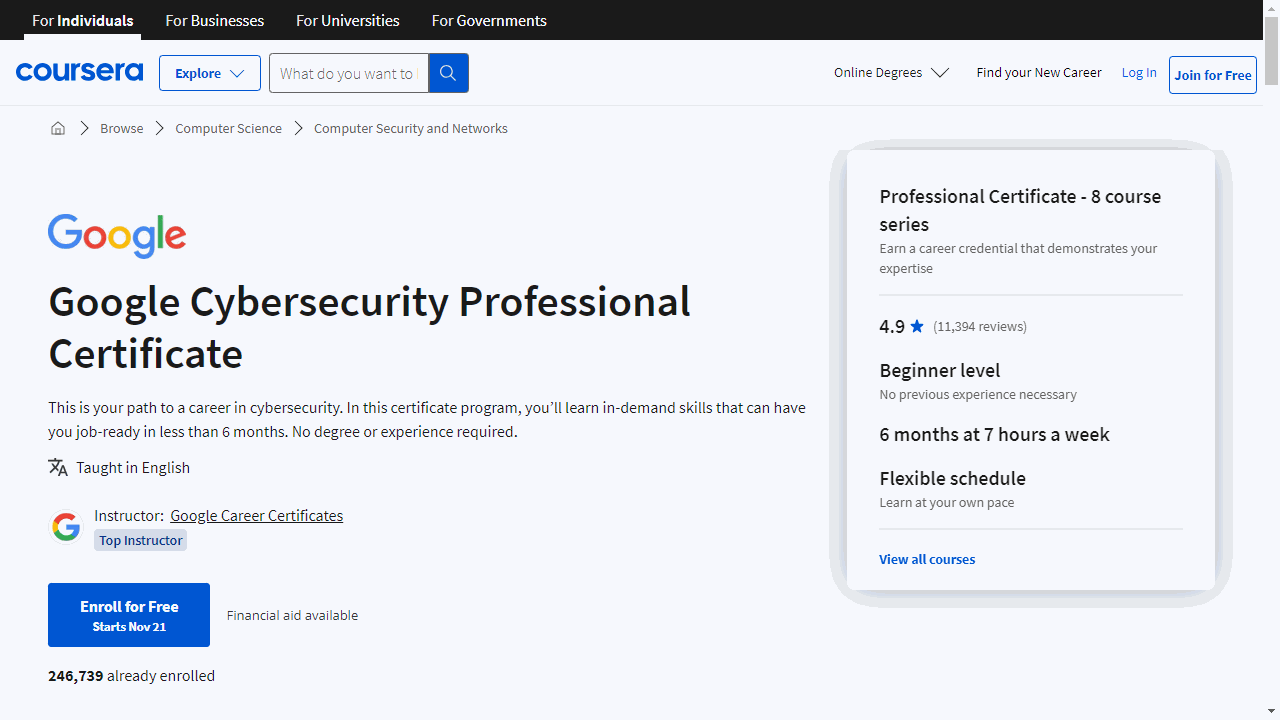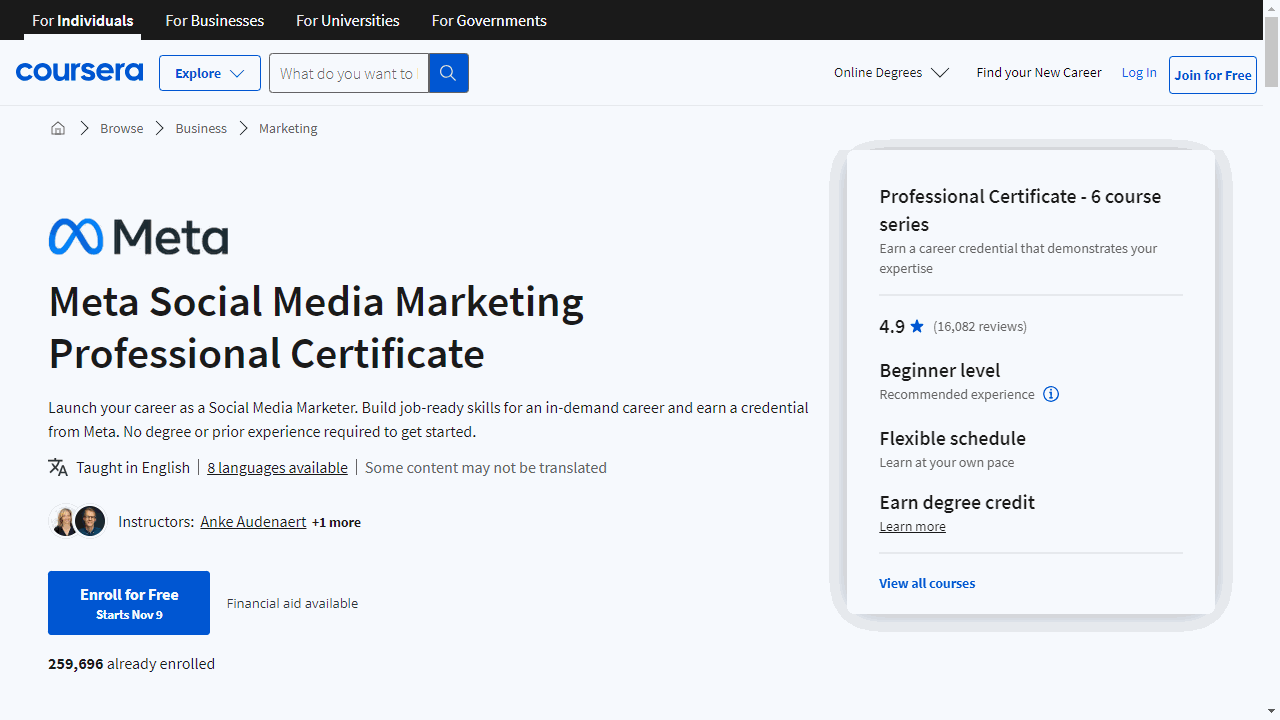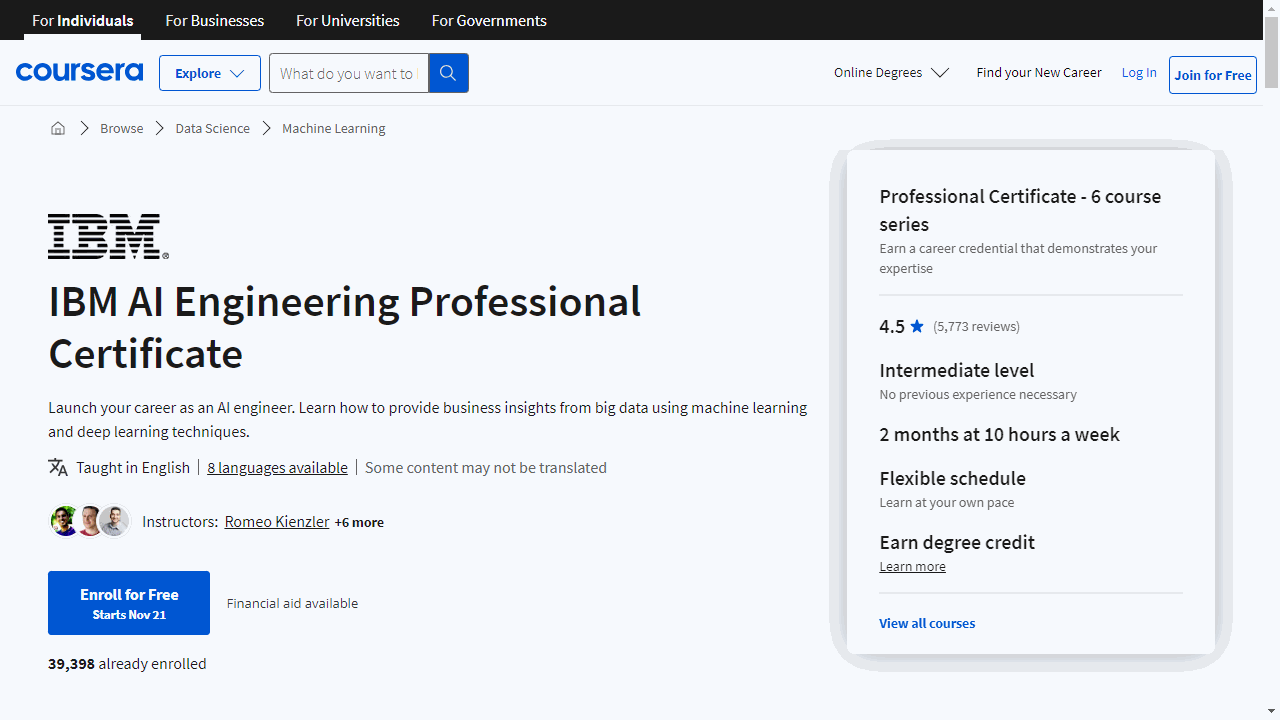The right professional certificate can be a powerful tool to boost your career prospects and help you stand out in a competitive job market.
Coursera, a leading online learning platform, offers an extensive range of professional certificate programs that can enhance your skills and knowledge in various domains.
With technology shaping the future of work, it’s essential to invest in your professional development and stay updated with the latest tools and techniques in your field.
Coursera’s professional certificates are designed in collaboration with industry leaders and top educational institutions, ensuring that the skills you acquire are highly relevant and in-demand.
In this blog post, we’ll guide you through some of the best professional certificate programs on Coursera, spanning fields such as IT, data science, project management, UX design, and more.
Each program has been carefully selected based on its course content, industry recognition, and potential career impact.
These programs are comprehensive, covering a wide range of topics within each domain.
The platform offers a flexible learning experience, allowing you to study at your own pace and gain practical skills through hands-on projects.
Whether you’re looking to break into a new industry or advance your current career, Coursera’s professional certificates can be a valuable asset.
So, if you’re ready to take your career to the next level, read on to discover the top professional certificates that Coursera has to offer!
Google IT Support Professional Certificate
Provider: Google
Embarking on a journey to become an IT support specialist?
The “Google IT Support Professional Certificate” on Coursera is a comprehensive program that could be just what you’re looking for.
The journey begins with “Technical Support Fundamentals,” where you’ll get acquainted with the IT landscape.
This course isn’t just about theory; it’s hands-on, allowing you to understand the binary system, put together a computer, and install operating systems.
You’ll also gain insight into the Internet’s workings and the intricacies of computer software, all while honing your problem-solving and customer service skills.
Moving on to “The Bits and Bytes of Computer Networking,” this course demystifies the complex world of networks.
You’ll learn about the layered nature of computer networks, delve into TCP/IP protocols, and acquire network troubleshooting skills.
It also introduces you to the essentials of cloud computing, including storage and services, which are vital in today’s tech ecosystem.
With “Operating Systems and You: Becoming a Power User,” you’ll dive deeper into the operational side of computers.
Whether it’s through a graphical user interface or command line, you’ll learn to navigate, configure, and manage both Windows and Linux systems.
This course is about giving you the practical skills to manage software, users, and hardware effectively.
In “System Administration and IT Infrastructure Services,” the focus shifts to managing multiple systems within an organization.
You’ll explore how to select the right hardware, understand infrastructure services, and leverage cloud resources efficiently.
The course also covers directory services and disaster recovery, preparing you to maintain and protect an organization’s IT infrastructure.
Lastly, “IT Security: Defense against the digital dark arts” arms you with the knowledge to safeguard digital assets.
You’ll delve into encryption, understand the principles of authentication and authorization, and learn how to mitigate risks.
This course is crucial for anyone looking to ensure the security and integrity of a network.
Each course in the certificate program is designed to build on the previous one, ensuring a smooth learning curve.
You’ll gain not just theoretical knowledge but also practical skills through a blend of video lectures, demonstrations, and hands-on practice.
This program is a solid step towards a career in IT, providing you with the skills that are in demand in the workforce today.
Google Data Analytics Professional Certificate
Provider: Google
If you’re searching for the best courses in data science, the Google Data Analytics Certificate on Coursera is a fantastic option.
This program is a comprehensive suite of eight courses that cover everything from the foundations of data analytics to the application of R programming.
The first course, “Foundations: Data, Data, Everywhere,” is a great starting point. It introduces you to the world of data analytics and provides an overview of the key analytical skills and tools you’ll need, such as data cleaning, data analysis, and data visualization.
The course is taught by current Google data analysts, which gives you a real-world perspective on the subject matter.
The second course, “Ask Questions to Make Data-Driven Decisions,” builds on the first course and focuses on the importance of questioning and decision-making in data analysis, which is often overlooked in similar courses.
The third course, “Prepare Data for Exploration,” introduces you to new topics that will help you gain practical data analytics skills.
You’ll learn how to use tools like spreadsheets and SQL to extract and make use of the right data for your objectives.
The fourth course, “Process Data from Dirty to Clean,” teaches you how to check and clean your data using spreadsheets and SQL.
This course stands out because it focuses on the importance of data integrity and provides you with hands-on ways to accomplish common data analyst tasks.
The fifth course, “Analyze Data to Answer Questions,” explores the “analyze” phase of the data analysis process.
You’ll learn how to organize and format your data using spreadsheets and SQL to help you look at and think about your data in different ways.
The sixth course, “Share Data Through the Art of Visualization,” shows you how data visualizations can help bring your data to life.
You’ll also explore Tableau, a data viz platform that will help you create effective visualizations for your presentations.
The seventh course, “Data Analysis with R Programming,” introduces you to the programming language known as R.
I would prefer you take a course in Python, but R is still a great language to learn for data analysis.
It’s the second most popular programming language for data analysis, after Python, and this course will teach you how to use it for data analysis.
You’ll discover how R lets you clean, organize, analyze, visualize, and report data in new and more powerful ways.
The final course, “Google Data Analytics Capstone: Complete a Case Study,” gives you the opportunity to apply what you’ve learned in a real-world context.
You’ll choose an analytics-based scenario and complete a case study, which is a great way to showcase your skills to potential employers.
Overall, the Google Data Analytics Certificate is a comprehensive and practical program that equips you with the skills needed to apply for introductory-level data analyst jobs.
The courses are well-structured, engaging, and taught by industry professionals.
IBM Data Science Professional Certificate
Provider: IBM
The first course, “What is Data Science?” provides a solid foundation for understanding the field of data science.
It’s a great starting point for anyone interested in this field, offering insights into the work of data scientists and the importance of data science in today’s data-driven world.
The course has a high rating of 4.7, indicating that many learners found it valuable.
Next, “Tools for Data Science” introduces you to the essential tools used by data science professionals.
You’ll get hands-on experience with tools like Jupyter Notebooks, RStudio IDE, Git, GitHub, and Watson Studio.
This course is highly practical, allowing you to test each tool and run simple code in Python, R, or SQL.
The “Data Science Methodology” course teaches you how to think and work like a successful data scientist.
You’ll learn about the six-stage CRISP-DM data science methodology, which is widely used by professional data scientists.
“Python for Data Science, AI & Development” is a beginner-friendly course that takes you from zero to programming in Python in a matter of hours.
You’ll learn about Python basics, different data types, and how to use Python libraries such as Pandas, Numpy & Beautiful Soup.
The “Python Project for Data Science” is a mini-course designed to kickstart your portfolio by demonstrating your foundational Python skills for working with data.
You’ll work on a real-world data set and scenario to identify patterns and trends, showcasing your proficiency with Python and data science tools.
One skill that can never be overlooked in data science is SQL.
From the most senior machine learning engineers to the most junior data analysts, SQL is a skill that shows up in almost every data science job description.
“Databases and SQL for Data Science with Python” equips you with a working knowledge of SQL, a powerful language used for communicating with and extracting data from databases. You’ll learn SQL from the basics to advanced concepts like JOINs.
“Data Analysis with Python” takes you from the basics of data analysis with Python to building and evaluating data models.
You’ll learn how to import data from multiple sources, clean and wrangle data, perform exploratory data analysis (EDA), and create meaningful data visualizations.
“Data Visualization with Python” teaches you how to effectively visualize both small and large-scale data using the very popular Python libraries Matplotlib, Seaborn, and Folium.
You’ll learn to create various types of basic and advanced graphs and charts, and even interactive dashboards.
“Machine Learning with Python” dives into the world of Machine Learning (ML) using Python.
You’ll learn about different machine learning algorithms and get hands-on experience building, evaluating, and comparing several Machine Learning models using the popular Scikit-learn library.
Finally, the “Applied Data Science Capstone” is the final course in the IBM Data Science Professional Certificate.
This capstone project course gives you the chance to apply what you’ve learned in the previous courses to a real-world scenario.
Google Project Management: Professional Certificate
Provider: Google
Google’s Project Management Professional Certificate offers a complete education in modern project management.
Throughout the six courses, you’ll gain both hard and soft skills needed to lead projects and teams in any industry.
The program starts with “Foundations of Project Management”. Here you’ll get oriented with PM terminology, roles, and responsibilities. You’ll also preview potential career paths to motivate your learning.
Next is “Project Initiation”, where you’ll master starting projects right by defining goals, scope, stakeholders, and charters. Practical templates help you set expectations and assign responsibilities.
“Project Planning” dives into building plans and budgets. You’ll learn to estimate timelines, procure resources, assess risks, and draft communications plans. Industry tips and tools simplify complex planning.
In “Project Execution”, you’ll discover techniques to track work, manage changes, ensure quality, improve processes, analyze data, and lead teams through the realities of running a project.
“Agile Project Management” explores faster, flexible approaches like Scrum. You’ll learn key events, backlogs, roles, and coaching strategies to adapt PM frameworks.
Finally, an immersive Capstone enables you to apply your new expertise through real-world exercises. You’ll build a portfolio to showcase career readiness.
Throughout the certificate, Google PMs share insider perspectives. The skills are practical and actionable, rooted in data, tools, and workflows used every day by Google teams.
Upon completion, you’ll earn a certificate from a world-leading tech company.
Google UX Design Professional Certificate
Provider: Google
This program is tailored to equip you with the skills necessary for entry-level UX design positions, and it does so with a practical, hands-on approach that’s grounded in real-world application.
The initial course, “Foundations of User Experience (UX) Design,” lays the groundwork.
It’s not just about learning the terminology; it’s about understanding the significance of UX design in the broader context of user satisfaction and business success.
You’ll delve into user-centered design, accessibility, and equity-focused design—key concepts that form the backbone of a UX designer’s role.
As you progress to “Start the UX Design Process: Empathize, Define, and Ideate,” you’ll begin to see through the eyes of the user.
This course emphasizes empathy, a critical skill for any designer.
You’ll learn to identify user needs and brainstorm creative solutions, setting the stage for your portfolio project.
In “Build Wireframes and Low-Fidelity Prototypes,” the focus shifts to visualization.
Here, you’ll sketch out your ideas and use tools like Figma to create wireframes, translating abstract concepts into tangible designs.
This step is crucial as it bridges the gap between what users need and the final product they’ll interact with.
“Conduct UX Research and Test Early Concepts” teaches you to validate your designs through user feedback.
This course reinforces the idea that good design is not just about aesthetics but also about functionality and user satisfaction.
You’ll learn to conduct research studies, analyze data, and refine your designs based on real user input.
With “Create High-Fidelity Designs and Prototypes in Figma,” your designs gain polish and interactivity.
This course is where your prototypes start to mirror a finished product, allowing you to test and iterate with a high level of detail.
The sixth course, “Build Dynamic User Interfaces (UI) for Websites,” expands your skill set to the web.
You’ll apply design principles to create responsive websites, learning about information architecture and common web layouts.
This course also offers guidance on job preparation, from crafting a resume to building a professional portfolio website.
Finally, “Design a User Experience for Social Good & Prepare for Jobs” brings your learning full circle.
You’ll undertake a comprehensive project with a focus on social impact, demonstrating your ability to create meaningful and user-friendly designs.
Additionally, this course prepares you for the job market, offering interview advice and insights into the world of freelance design.
The courses are designed to simulate the UX design process, with Google’s own UX designers and researchers as your mentors.
And with no prior experience required, the program is accessible to anyone with a passion for design and a willingness to learn.
IBM Data Analyst Professional Certificate
Provider: IBM
This comprehensive program offers a series of courses that cover everything from the basics of data analysis to advanced techniques and tools.
The first course, Introduction to Data Analytics, provides a solid foundation in the field, explaining the roles of data analysts, data scientists, and data engineers.
You’ll learn about the data ecosystem, including databases, data warehouses, and big data platforms.
By the end of the course, you’ll understand the fundamentals of the data analysis process, including gathering, cleaning, analyzing, and sharing data.
Next, the Excel Basics for Data Analysis course will give you a basic working knowledge of Excel and how to use it for analyzing data.
You’ll learn how to perform basic data wrangling and cleansing tasks using functions, and expand your knowledge of data analysis through the use of filtering, sorting, and pivot tables.
The Data Visualization and Dashboards with Excel and Cognos course will teach you how to create compelling data visualizations and dashboards.
You’ll learn how to use business intelligence (BI) tools like Cognos Analytics to create interactive dashboards.
This course is a great way to learn how to communicate your data analysis findings effectively.
The Python for Data Science, AI & Development course is a comprehensive introduction to Python, the most popular languages in the data science world.
You’ll learn about Python basics, data structures, and how to use Python libraries such as Pandas, Numpy & Beautiful Soup.
The Python Project for Data Science course is a mini-course designed to help you demonstrate your Python skills.
You’ll work on a real-world data set and scenario, performing tasks such as extracting data, web scraping, visualizing data, and creating a dashboard.
The Databases and SQL for Data Science with Python course is a must for any data professional.
You’ll learn SQL from the ground up, from basic SELECT statements to advanced concepts like JOINs.
The Data Analysis with Python course will take you from the basics of data analysis with Python to building and evaluating data models.
You’ll learn how to import data from multiple sources, clean and wrangle data, perform exploratory data analysis (EDA), and create meaningful data visualizations.
The Data Visualization with Python course will teach you many ways to effectively visualize both small and large-scale data.
You’ll learn to create various types of basic and advanced graphs and charts, and create interactive dashboards.
Finally, the IBM Data Analyst Capstone Project will allow you to apply everything you’ve learned in a real-world context.
You’ll perform various tasks that professional data analysts do as part of their jobs, including data collection, data wrangling, exploratory data analysis, statistical analysis, data visualization, and interactive dashboard creation.
Google Cloud DevOps Engineer Professional Certificate
Provider: Google Cloud
This series of courses is designed to build a strong foundation in Google Cloud, and it’s structured to guide you through the complexities of cloud infrastructure and operations.
Starting with “Google Cloud Fundamentals: Core Infrastructure,” you’ll gain a clear understanding of Google Cloud’s core services.
This course isn’t just about theory; it’s interactive, with hands-on labs that allow you to apply what you learn by creating a basic infrastructure setup.
You’ll come away with the ability to discern which Google Cloud storage options best fit various scenarios.
Moving on, “Developing a Google SRE Culture” introduces you to the principles of Site Reliability Engineering (SRE), a methodology pioneered by Google to ensure that development and operations teams work harmoniously.
This course will help you understand the value of SRE and how to implement its practices to enhance collaboration and efficiency within your organization.
For those looking to design resilient cloud solutions, “Reliable Google Cloud Infrastructure: Design and Process” is invaluable.
It builds upon previous courses, focusing on designing deployments that meet stringent business and technical requirements.
You’ll learn to articulate application requirements, secure your cloud environment, and ensure your infrastructure is both reliable and cost-effective.
Monitoring and logging are critical for maintaining performance, which is where “Logging and Monitoring in Google Cloud” comes in.
This course equips you with the skills to set up comprehensive monitoring systems, create alerts, and analyze logs.
These capabilities are crucial for proactively managing cloud infrastructure and ensuring issues are addressed promptly.
Lastly, “Getting Started with Google Kubernetes Engine” demystifies Kubernetes, a key tool for modern cloud applications.
You’ll explore containerization with Google Kubernetes Engine, learning to deploy and manage containerized applications efficiently.
The course breaks down Kubernetes architecture and operations, making it accessible even if you’re new to the concept.
Each course in this professional certificate program is designed to be practical and applicable.
You’ll engage with real-world case studies and gain experience that directly translates to on-the-job scenarios.
It’s a thoughtful blend of theory and practice, leading to a well-rounded skill set in Cloud DevOps.
IBM Applied AI Professional Certificate
Provider: IBM
Embarking on the IBM Applied AI Professional Certificate through Coursera is a strategic move if you are curious about the burgeoning field of Artificial Intelligence.
This suite of courses is meticulously designed to cater to learners from all walks of life, regardless of their technical expertise.
The journey begins with “Introduction to Artificial Intelligence (AI),” a course that demystifies AI for the uninitiated.
It’s an accessible entry point that doesn’t demand a background in programming or computer science.
You’ll come to understand AI’s transformative impact on society, grasp foundational concepts like machine learning, and consider the ethical implications of this powerful technology.
For those intrigued by the creative potential of AI, “Generative AI: Introduction and Applications” offers a deep dive into the world of content creation through AI.
You’ll explore the capabilities of groundbreaking models and tools, such as GPT and DALL-E, and understand their practical applications across various domains.
The course includes hands-on labs, allowing you to experiment with IBM’s Generative AI Classroom and familiarize yourself with generative models.
Delving further into the nuances of AI, “Generative AI: Prompt Engineering Basics” teaches you the art of prompt engineering.
This skill is crucial for steering generative AI models to produce targeted outcomes.
Through this course, you’ll learn to craft effective prompts and utilize IBM’s prompt engineering tools, enhancing the precision and relevance of AI-generated content.
If coding isn’t your forte, “Building AI Powered Chatbots Without Programming” is an ideal pick.
This course empowers you to create engaging chatbots using IBM Watson’s Natural Language Processing capabilities, all without writing a single line of code.
You’ll learn to deploy these chatbots on a website, ensuring they provide value and enhance user experience.
If you are ready to tackle programming, “Python for Data Science, AI & Development” is a comprehensive introduction to one of the most sought-after programming languages in the industry.
You’ll start from the basics and quickly progress to using Python for data manipulation and web scraping, building a solid foundation for further exploration in data science and AI.
Putting your Python skills to practical use, “Developing AI Applications with Python and Flask” guides you through creating AI-enabled web applications.
This project-based course reinforces your understanding of Python and introduces Flask, a micro web framework, as you develop and deploy an AI application.
Lastly, “Building AI Applications with Watson APIs” rounds out the certificate by teaching you to integrate multiple Watson AI services.
You’ll gain insights into best practices for creating sophisticated AI applications that can interact with users through text and voice, preparing you to build systems that can be deployed across various platforms.
Each course in the IBM Applied AI Professional Certificate is a stepping stone towards fluency in AI.
You’ll gain practical skills, work on projects that bolster your portfolio, and learn from one of the leading names in technology.
This certificate is more than just a learning experience—it’s an investment in your future in the AI landscape.
IBM DevOps and Software Engineering Professional Certificate
Provider: IBM
This program is tailored to provide a well-rounded education, from the fundamentals of DevOps to the intricacies of cloud computing and beyond.
The “Introduction to DevOps” course is where you’ll start, gaining insight into the collaborative culture that drives high-performing teams.
You’ll explore essential practices like CI/CD and get a taste of cloud native architecture, setting a strong foundation for building robust applications.
Cloud computing is no longer just a buzzword, and the “Introduction to Cloud Computing” course ensures you understand why.
It covers everything from service models to the architecture of the cloud, preparing you to deploy applications with confidence.
The hands-on project at the end is a practical way to apply what you’ve learned.
Agile and Scrum methodologies are at the heart of modern software development, and “Introduction to Agile Development and Scrum” will help you master these approaches.
You’ll learn to plan sprints, manage backlogs, and improve team efficiency, all while fostering a collaborative environment.
If you enjoy the technical side, “Hands-on Introduction to Linux Commands and Shell Scripting” offers a deep dive into the Linux operating system.
You’ll learn to navigate the terminal and write scripts that automate tasks, skills that are invaluable in today’s tech landscape.
Version control is essential, and “Getting Started with Git and GitHub” demystifies this process.
You’ll learn how to manage code changes and collaborate effectively using GitHub, a skill that’s critical for any software engineering role.
Python is a versatile language, and “Python for Data Science, AI & Development” introduces you to its potential. Whether you’re interested in data analysis, AI, or general development, this course provides the tools to start coding with Python.
The “Developing AI Applications with Python and Flask” course allows you to apply your Python skills to the exciting world of AI.
You’ll build web applications using Flask and integrate AI features, preparing you for the future of software development.
Containerization is changing the deployment landscape, and “Introduction to Containers w/ Docker, Kubernetes & OpenShift” ensures you’re up to speed.
You’ll learn how to use these tools to create flexible, scalable applications—a skill that’s increasingly important in the industry.
Microservices and serverless architectures are modern approaches to building applications, and “Application Development using Microservices and Serverless” guides you through these concepts.
You’ll learn to develop and deploy applications in a way that’s both efficient and scalable.
Testing is crucial, and “Introduction to Test and Behavior Driven Development” focuses on ensuring your code works as intended.
You’ll practice writing tests that keep your development process on track and your end product reliable.
Automation is a key component of DevOps, and “Continuous Integration and Continuous Delivery (CI/CD)” teaches you how to streamline the software delivery process.
You’ll explore tools and practices that make releasing software faster and more reliable.
Security is non-negotiable, and “Application Security for Developers and DevOps Professionals” equips you with the knowledge to safeguard your applications.
You’ll delve into security best practices and learn how to integrate security measures throughout the development lifecycle.
Lastly, “Monitoring and Observability for Development and DevOps” teaches you how to keep your applications running smoothly.
You’ll get hands-on with monitoring tools and learn the principles of observability, ensuring you can maintain and improve your systems effectively.
The capstone project is where everything comes together.
You’ll apply all the skills you’ve acquired to develop and deploy a real-world application, demonstrating your readiness for a career in DevOps and software engineering.
This certificate program is comprehensive, offering a blend of theoretical knowledge and practical experience.
It’s designed to prepare you for a variety of roles in the tech industry, making it a smart investment for your future.
Google IT Automation with Python Professional Certificate
Provider: Google
This hands-on certificate program teaches you Python, Git and GitHub, Linux, and IT automation from the ground up.
You’ll start by learning basic Python programming.
“The Crash Course on Python” teaches you Python syntax, data structures, and how to build simple programs. No prior experience needed!
Next, “Using Python to Interact with the Operating System” shows you how to manipulate files, processes, and automate tasks on any operating system.
“Introduction to Git and GitHub” teaches you to track code changes and collaborate with version control.
The certificate also covers crucial troubleshooting and debugging skills. You’ll learn strategies to tackle common pitfalls in code and IT infrastructure.
“Configuration Management and the Cloud” helps you automate fleet management and cloud computing.
Finally, you’ll tie everything together by building real-world automation solutions in Python.
The skills covered equip you to automate tasks, process data, build tools to solve problems, and more.
IBM Full Stack Software Developer Professional Certificate
Provider: IBM
This certificate packs 12 hands-on coding courses that will take you from having zero experience to becoming a job-ready full stack developer.
The step-by-step curriculum covers everything you need - from core programming languages like Python and JavaScript to must-have developer tools like GitHub.
You’ll start by getting introduced to essential web development skills like HTML, CSS and JavaScript. Hands-on projects let you build interactive webpages and dynamic user interfaces.
From there, you’ll level up to advanced front-end frameworks like React and back-end technologies like Node.js.
Key courses guide you through building APIs, accessing databases, and connecting web apps using RESTful architecture.
You’ll gain real-world experience deploying apps on the cloud with containers and serverless platforms.
Throughout the courses, you’ll build a portfolio of projects to showcase your new skills.
And you’ll get familiar with in-demand dev practices like CI/CD pipelines, microservices, and Git workflows.
The certificate culminates in a capstone project where you’ll combine everything you’ve learned into one cloud-based full stack app.
This is the perfect way to demonstrate your skills and have a professional project ready for job interviews.
If you’re looking to break into the field, this is one of the best online programming courses to start with.
Preparing for Google Cloud Certification: Machine Learning Engineer Professional Certificate
Provider: Google Cloud
Created by Google Cloud, this program equips you with the skills to excel in machine learning and prepare for the Google Cloud Machine Learning Engineer certification exam.
Dive into “Google Cloud Big Data and Machine Learning Fundamentals” to understand the journey from data to AI.
You’ll learn to craft data pipelines and create machine learning models using Vertex AI and AutoML, giving you a practical start.
In “How Google does Machine Learning,” you’ll discover Google’s approach to ML, including best practices and responsible AI.
This course emphasizes the importance of ethical AI solutions.
“Launching into Machine Learning” focuses on data quality and analysis, teaching you to build and train models with BigQuery ML.
You’ll also master model optimization, ensuring your AI performs well.
“TensorFlow on Google Cloud” is where you’ll get technical, creating models with TensorFlow and Keras and learning to scale them with Vertex AI.
This course is essential for applying your models effectively.
With “Feature Engineering,” you’ll enhance your models by selecting impactful data features using tools like BigQuery ML and TensorFlow.
You’ll also get familiar with preprocessing and exploring features for better predictions.
“Machine Learning in the Enterprise” applies your skills to real-world business scenarios, exploring data management and when to use different modeling approaches.
It’s about making AI work in a corporate setting.
“Production Machine Learning Systems” prepares you to deploy robust ML systems.
You’ll tackle model dependencies and distributed training, ensuring your systems are ready for any challenge.
“MLOps: Getting Started” introduces you to deploying, monitoring, and operating ML systems.
You’ll adopt continuous improvement practices to keep your AI at its best.
Finally, “ML Pipelines on Google Cloud” deepens your expertise in ML pipelines with TensorFlow Extended (TFX) and MLflow.
You’ll learn to automate and manage the ML lifecycle, making your workflow efficient and scalable.
This professional certificate is a comprehensive path to becoming a skilled Machine Learning Engineer.
You’ll gain hands-on experience with Google Cloud tools, TensorFlow, and Keras, and understand the full machine learning workflow from data management to model deployment.
DeepLearning.AI TensorFlow Developer Professional Certificate
Provider: DeepLearning.AI
This series of courses is designed to equip you with the TensorFlow expertise needed to build AI algorithms that scale.
The journey begins with “Introduction to TensorFlow for Artificial Intelligence, Machine Learning, and Deep Learning,” where you’ll grasp the essentials of TensorFlow and construct a neural network for image recognition tasks.
It’s a practical first step that lays a solid foundation for more advanced concepts.
As you progress to “Convolutional Neural Networks in TensorFlow,” you’ll delve into sophisticated image processing techniques.
This course sharpens your skills in handling diverse image data and introduces you to strategies like augmentation and dropout to combat overfitting.
Transfer learning is also covered, teaching you to leverage pre-trained models for enhanced performance.
Shifting focus to language, “Natural Language Processing in TensorFlow” offers a deep dive into text handling and sentiment analysis.
You’ll explore tokenization, vectorization, and the use of recurrent neural networks (RNNs), including GRUs and LSTMs, to process and generate text.
Finally, “Sequences, Time Series and Prediction” rounds out your education with an exploration of time series data.
You’ll learn to prepare and forecast data, employing RNNs and ConvNets for tasks like sunspot prediction, which combines scientific inquiry with machine learning.
Each course is rich with practical applications, ensuring you not only learn the theory but also how to apply it.
The certificate is self-paced, allowing you to learn on your schedule, and it’s backed by DeepLearning.AI’s reputation for quality AI education.
Google Digital Marketing & E-commerce Professional Certificate
Provider: Google
This series of courses by Google is tailored for those eager to enter the digital marketing and e-commerce fields, with no prior experience required.
It starts with “Foundations of Digital Marketing and E-commerce,” where you’ll gain a solid understanding of the industry’s landscape.
You’ll learn about different roles, the importance of the marketing funnel, and how customer journeys shape marketing strategies.
Real-world examples from Google professionals make the learning experience tangible and immediately applicable.
As you progress to “Attract and Engage Customers with Digital Marketing,” the focus shifts to actionable skills like SEO and SEM.
This course builds your proficiency in techniques to increase your website’s traffic and engage potential customers effectively.
It’s about understanding the mechanics behind online visibility and how to leverage them to your advantage.
Social media’s role in business is undeniable, and “From Likes to Leads: Interact with Customers Online” helps you navigate this space with purpose.
You’ll learn to select the right platforms for your goals, craft engaging content, and use social media advertising to convert interactions into tangible outcomes.
Email marketing remains a cornerstone of digital communication, and “Think Outside the Inbox: Email Marketing” delves into creating impactful email campaigns.
From writing compelling content to managing subscriber lists and automating communications, this course covers the essentials of email marketing.
Data analysis is crucial for measuring success, and “Assess for Success: Marketing Analytics and Measurement” introduces you to tools like Google Analytics.
You’ll learn to interpret data, make informed decisions, and present your findings, turning numbers into narratives that resonate with stakeholders.
In “Make the Sale: Build, Launch, and Manage E-commerce Stores,” you’ll explore the nuts and bolts of online selling.
Setting up a mock store on Shopify and learning to engage customers through ads provides a practical framework for understanding e-commerce operations.
The capstone course, “Satisfaction Guaranteed: Develop Customer Loyalty Online,” teaches strategies to cultivate customer loyalty.
You’ll discover how to maintain client relationships and use performance data to refine your e-commerce strategy, ensuring long-term success.
Each course builds on the last, creating a comprehensive learning experience. Google experts provide guidance, sharing insights and tools used in the industry.
By the end of the program, you’ll have a portfolio to showcase your skills and the confidence to pursue entry-level job opportunities.
IBM Cybersecurity Analyst Professional Certificate
Provider: IBM
Begin with “Introduction to Cybersecurity Tools & Cyber Attacks,” where you’ll grasp the evolution of cyber threats and familiarize yourself with fundamental security concepts and tools.
This course lays the groundwork for understanding the complexities of protecting digital assets.
Progress to “Cybersecurity Roles, Processes & Operating System Security,” which delves into the human aspect of cybersecurity.
You’ll explore various roles and their responsibilities, and gain practical knowledge of operating system commands.
Understanding virtualization’s impact on security is another key takeaway.
The “Cybersecurity Compliance Framework & System Administration” course is pivotal for those looking to navigate the maze of industry standards and compliance requirements.
It also covers the nuts and bolts of user and server administration, emphasizing the importance of endpoint security and the intricacies of cryptography.
Network security is the focus of the “Network Security & Database Vulnerabilities” course.
Here, you’ll dive into the technicalities of network infrastructure and learn how to identify and mitigate database vulnerabilities—a critical skill for safeguarding an organization’s data.
“Penetration Testing, Incident Response and Forensics” offers a hands-on approach to proactive security measures and reactive strategies.
You’ll explore the tools and techniques for penetration testing, learn to craft effective incident response plans, and understand the meticulous process of digital forensics.
In “Cyber Threat Intelligence,” the curriculum shifts to defensive strategies and the importance of threat intelligence.
You’ll learn to use tools for network monitoring and data protection, ensuring you’re well-versed in the latest defensive tactics.
The program culminates with the “Cybersecurity Capstone: Breach Response Case Studies,” where you apply your cumulative knowledge to real-world scenarios.
This practical exercise simulates the decision-making process in the aftermath of a cyber breach, preparing you for real-life challenges.
Completing the series with the “IBM Cybersecurity Analyst Assessment” solidifies your understanding and earns you the IBM Cybersecurity Analyst Professional Certificate, a testament to your readiness for a role in the field.
Google Cloud Data Engineer Professional Certificate
Provider: Google Cloud
This series of courses is designed to equip you with the skills needed to pass the Google Cloud Professional Data Engineer certification exam.
The journey begins with “Google Cloud Big Data and Machine Learning Fundamentals,” where you’ll delve into the essentials of big data and machine learning on Google Cloud.
This course isn’t just about theory; it’s about applying what you learn to real-world scenarios, using tools like TensorFlow and BigQuery to process and analyze large datasets.
As you progress to “Modernizing Data Lakes and Data Warehouses with Google Cloud,” you’ll tackle the distinctions between data lakes and warehouses—knowledge critical for any data engineer.
Understanding these storage solutions and their use cases is key to managing data effectively, and this course provides the technical detail you need to make informed decisions.
In “Building Batch Data Pipelines on Google Cloud,” the focus shifts to data transformation.
Here, you’ll explore various methods for batch data processing, including the use of BigQuery and Dataflow.
The course offers practical experience, allowing you to build your own data pipeline components, a skill that’s invaluable in the field.
For real-time data processing, “Building Resilient Streaming Analytics Systems on Google Cloud” has you covered.
You’ll learn to handle streaming data using Pub/Sub, apply transformations with Dataflow, and store processed records for analysis.
This course is about keeping pace with the data that businesses generate every second, ensuring that your analytics are current and actionable.
“Smart Analytics, Machine Learning, and AI on Google Cloud” is where data engineering meets the future.
This course introduces you to the integration of machine learning into data pipelines, covering both AutoML for ease of use and more customized solutions using Notebooks and BigQuery ML.
It’s a practical approach to making your data work smarter, not harder.
Lastly, “Preparing for your Professional Data Engineer Journey” is the strategic final step.
It’s designed to help you assess your readiness for the Google Cloud Professional Data Engineer certification exam, one of a few credentials that can significantly boost your career prospects.
Arizona State University TESOL Professional Certificate
Provider: Arizona State University
This TESOL certificate from ASU offers a comprehensive path to mastering English language teaching, with a focus on practical skills, current methodologies, and technological integration.
Dive into “Teach English Now! Foundational Principles” to grasp the basics of language learning.
You’ll discover how to motivate students, control your classroom, and differentiate between learning and acquisition, all while leveraging technology to enhance your teaching.
Build upon this foundation with “Teach English Now! Theories of Second Language Acquisition,” where you’ll craft your teaching philosophy and delve into effective practices for teaching listening, speaking, and pronunciation.
You’ll also gain insights into grammar translation and audio-lingual methods, anchored in second language acquisition research.
“Teach English Now! Lesson Design and Assessment” teaches you to create engaging lesson plans that balance memory and knowledge learning.
You’ll learn to start classes with warm-up activities that capture students’ attention and make content stick.
The “Teach English Now! Capstone Project 1” offers a hands-on experience, where you’ll observe teachers, analyze lessons, and develop your teaching philosophy.
You’ll also design a lesson plan and share teaching tips, culminating in a peer-reviewed teaching video.
Completing both parts of “Teach English Now!” qualifies you for ASU’s 150-hour TESOL Certificate.
For those focused on literacy, “Teach English Now! Second Language Reading, Writing, and Grammar” provides strategies for teaching reading and writing, integrating grammar in a way that’s natural and engaging.
In “Teach English Now! Second Language Listening, Speaking, and Pronunciation,” you’ll tackle the challenges of teaching oral skills and learn to incorporate pronunciation effectively into your lessons.
“Teach English Now! Technology Enriched Teaching” keeps you at the forefront of educational technology, ensuring you can integrate the latest tools without overshadowing the language learning process.
Finally, “Teach English Now! Capstone Project 2” is where you’ll refine your teaching practice, recording and submitting ten videos to demonstrate your growth and proficiency.
Google Cybersecurity Professional Certificate
Provider: Google
This certificate is designed to equip you with the foundational skills necessary for an entry-level cybersecurity position, and it does so with a clear, structured approach.
The journey begins with “Foundations of Cybersecurity,” where you’ll gain an understanding of the field’s history and its significance in modern business.
You’ll explore the roles and essential skills of a cybersecurity analyst, guided by Google’s own experts.
The course also introduces you to the CISSP security domains and the tools commonly used in the industry.
Building on that foundation, “Play It Safe: Manage Security Risks” delves into risk management, teaching you about security frameworks and controls.
You’ll learn to conduct a security audit and respond to threats, arming you with practical knowledge of the NIST framework.
As you progress to “Connect and Protect: Networks and Network Security,” the focus shifts to the intricacies of networking.
Understanding how data travels and the importance of securing networks against attacks is crucial, and this course covers that, including the use of firewalls and VPNs.
“Tools of the Trade: Linux and SQL” hones in on technical skills.
You’ll get comfortable with the Linux command line and SQL database management—skills that are indispensable for cybersecurity professionals.
In “Assets, Threats, and Vulnerabilities,” the curriculum encourages you to adopt an attacker’s mindset to better defend against threats.
You’ll learn about encryption, authentication, and threat modeling, which are key to identifying and mitigating risks.
The sixth course, “Sound the Alarm: Detection and Response,” is where you’ll tackle incident detection and response.
You’ll get hands-on with tools like IDS and SIEM, learning to analyze network traffic and respond to security incidents effectively.
“Automate Cybersecurity Tasks with Python” introduces you to Python programming, demonstrating how automation can enhance security measures.
You’ll write scripts to streamline tasks, a skill that boosts efficiency and effectiveness.
Finally, “Put It to Work: Prepare for Cybersecurity Jobs” focuses on the soft skills and practical steps needed to secure a job.
From crafting a resume to acing an interview, this course prepares you to present your newfound skills to potential employers.
Throughout the certificate, Google’s cybersecurity professionals provide insights and mentorship, ensuring that the knowledge you gain is both current and applicable.
The courses are designed to be interactive and engaging, with a balance of theory and hands-on practice.
This certificate stands out for its accessibility; no prior experience is needed to start.
It’s a comprehensive program that covers a broad range of topics without overwhelming you.
Meta Social Media Marketing Professional Certificate
Provider: Meta
This program is designed by Meta to take you from a beginner to a skilled practitioner in the realm of social media marketing.
And who better to learn from than the company that owns the world’s largest social media platforms?
The first step is “Introduction to Social Media Marketing,” where you’ll gain a clear understanding of the marketing landscape.
This course doesn’t just scratch the surface; it delves into selecting the right channels, setting achievable goals, and understanding your audience’s journey.
It’s a solid foundation, and the best part is that it’s accessible to anyone with basic internet skills.
Moving on, “Social Media Management” is where your content creation skills will blossom.
You’ll learn to define your brand’s voice and manage a content calendar that keeps your audience engaged.
This course is particularly valuable for those looking to interact with customers and analyze content performance to refine their strategy.
For those interested in the power of paid advertising, “Fundamentals of Social Media Advertising” offers a deep dive into creating effective social media ads.
You’ll explore the nuances of ad campaigns, from the visuals and copy to understanding privacy policies.
The practical project of crafting a creative brief and launching an ad provides hands-on experience that’s invaluable in the real world.
“Advertising with Meta” elevates your skills further by introducing you to the Meta Ads Manager.
Here, you’ll learn to structure campaigns, target audiences, and manage budgets.
This course is crucial for anyone aiming to leverage Facebook and Instagram ads to reach their marketing objectives.
To ensure your campaigns are hitting the mark, “Measure and Optimize Social Media Marketing Campaigns” teaches you how to interpret campaign data and optimize your efforts.
You’ll get to grips with ROI analysis and A/B testing, skills that are essential for any marketer looking to improve their campaigns continuously.
The capstone of the program is the “Meta Social Media Marketing Capstone,” where everything you’ve learned is put into practice.
Completing this course means not only presenting a comprehensive marketing campaign but also earning the Meta Digital Marketing Associate Certification—a credential that can significantly boost your professional profile.
Overall, this certificate program is a well-rounded educational experience that prepares you for the demands of social media marketing.
It’s designed for eager learners of all levels and provides practical, real-world skills that are immediately applicable.
IBM AI Engineering Professional Certificate
Provider: IBM
Embarking on a journey through the IBM AI Engineering Professional Certificate on Coursera can be a transformative step in your career, whether you’re just starting out or looking to deepen your expertise in AI and Machine Learning.
The course “Machine Learning with Python” is an excellent starting point.
It eases you into the complex world of Machine Learning, covering essential concepts and algorithms.
You’ll gain practical experience with Python’s powerful libraries, such as SciPy and scikit-learn, and by the end of the course, you’ll be adept at building and evaluating diverse Machine Learning models.
Moving on, “Introduction to Deep Learning & Neural Networks with Keras” demystifies deep learning.
It’s a course that clarifies the nuances between traditional neural networks and their deep learning counterparts.
Through hands-on exercises, you’ll learn to construct deep learning models using Keras, gaining insights into both supervised and unsupervised deep learning models.
For those intrigued by how AI can interpret images, “Introduction to Computer Vision and Image Processing” offers a practical introduction.
You’ll explore the applications of computer vision and learn to manipulate images using Python, Pillow, and OpenCV.
The course culminates in a project where you’ll build a computer vision web app, providing a real-world application of your skills.
“Deep Neural Networks with PyTorch” delves into the PyTorch library, a favorite among researchers for its flexibility and ease of use.
Starting with the basics, the course guides you through the creation of advanced models, including the implementation of various activation functions, normalization, and dropout layers.
By the end, you’ll be proficient in building deep neural networks with PyTorch.
In “Building Deep Learning Models with TensorFlow,” you’ll explore TensorFlow’s capabilities in handling unstructured data.
The course covers a range of deep architectures and teaches you how TensorFlow can be applied to solve complex problems through deep learning, providing a solid foundation for further exploration and innovation.
The “AI Capstone Project with Deep Learning” is where you’ll apply everything you’ve learned to a real-world problem.
This project-based course allows you to select a library and develop a deep learning model, offering a chance to demonstrate your ability to handle a complete deep learning pipeline from data preprocessing to model validation.
